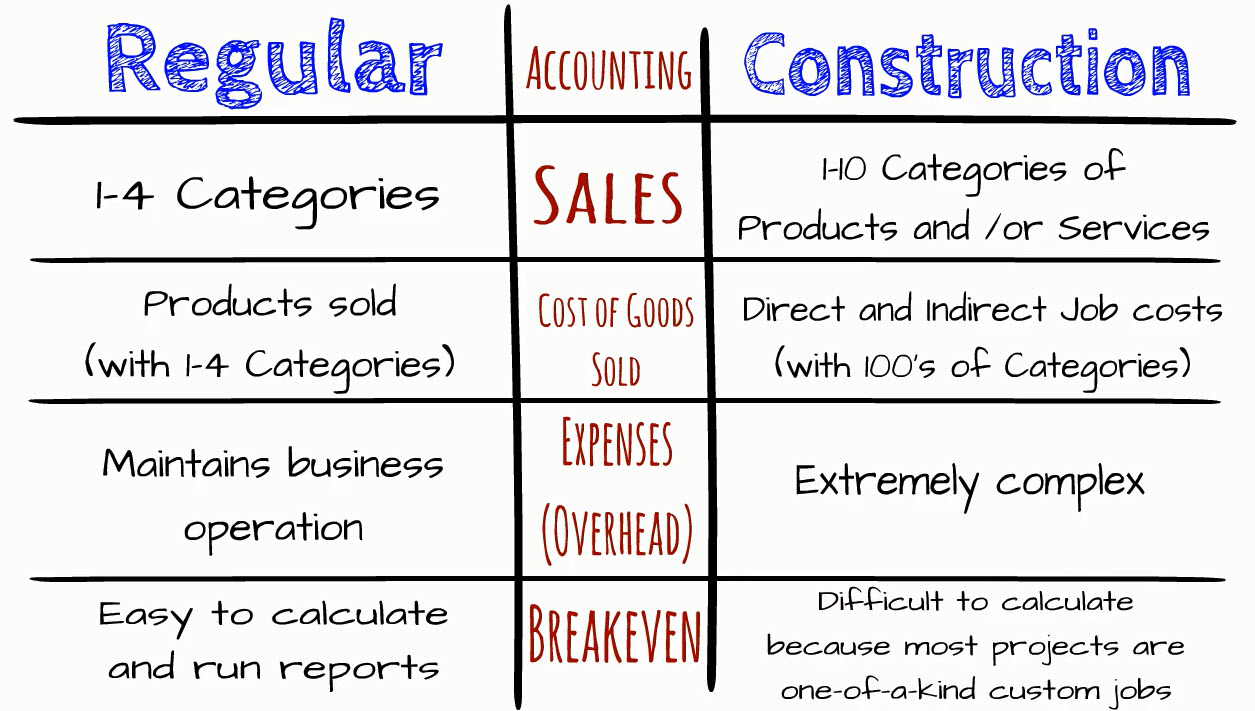Construction Accounting: Expert Solutions for Managing Project Budgets and Costs
Construction Accounting: Expert Solutions for Managing Project Budgets and Costs
Blog Article
Key Providers Offered in Building Accountancy to Boost Financial Oversight
In the world of building and construction accountancy, crucial services such as project cost evaluation, spending plan management, and capital evaluation play an important function in improving monetary oversight. These solutions not just enhance the budgeting process however likewise provide crucial understandings right into expenditure patterns and task productivity. By carefully keeping track of monetary metrics, stakeholders can make enlightened decisions that line up with task goals. The complexity of these services often increases questions about their application and effect on total task success. Comprehending these subtleties can substantially affect the efficiency of economic oversight in building and construction jobs.
Project Expense Estimate
Efficient task price estimation is a vital component of successful building accountancy solutions, as it straight impacts budgeting and economic preparation (construction accounting). Exact expense price quotes offer a thorough overview of the economic demands for a building task, enabling stakeholders to make educated choices concerning source allocation and project expediency
A detailed expense estimate procedure includes various elements, including labor, products, devices, overhead, and contingencies. By assessing historical information and existing market patterns, construction accountants can create sensible estimates that reflect true job costs. This logical approach not only aids in securing funding but likewise improves openness and liability among all events involved.
In addition, accurate expense estimation serves as a structure for tracking and controlling costs throughout the job's lifecycle. By developing a clear standard, building accounting professionals can recognize disparities between estimated and real costs, enabling for timely adjustments and interventions.
Inevitably, efficient job cost evaluation not only assists in smoother task execution but additionally strengthens the general monetary health of construction organizations, guaranteeing they continue to be competitive in an increasingly dynamic market. This tactical technique underscores the value of proficient experts in delivering precise and dependable expense estimates.
Budget Management
In the realm of construction bookkeeping services, spending plan monitoring plays a pivotal role in making certain that jobs stay monetarily practical and on track. Effective budget plan administration entails the organized planning, surveillance, and controlling of job costs to line up with monetary purposes. It begins with the creation of a thorough budget plan that accurately shows the expected prices of labor, materials, tools, and overhead based upon thorough job price estimate.
When the spending plan is established, recurring surveillance is vital. This includes routine analyses of actual expenses versus the allocated numbers, permitting for prompt identification of inconsistencies. By executing tools and software customized for building accounting, task supervisors can produce real-time records that help with notified decision-making.
Furthermore, proactive budget plan administration allows stakeholders to change economic allocations and sources as necessary, advertising flexibility in action to unexpected difficulties. This flexibility is essential in the building and construction sector, where project scopes can regularly change. Eventually, durable budget monitoring not only bolsters monetary responsibility however also boosts total task efficiency, guaranteeing effective conclusion within the assigned economic criteria.
Cash Money Circulation Evaluation
Capital analysis functions as a crucial element of building bookkeeping, allowing project managers to preserve a clear understanding of the inflow and outflow of funds throughout the project lifecycle. This logical procedure permits the identification of prospective cash money scarcities or surpluses, empowering supervisors to make informed decisions pertaining to budgeting and resource allocation.
By carefully tracking cash inflows from customer repayments, car loans, and various other revenue resources, along with keeping an eye on discharges such as labor, materials, and overhead expenses, task managers can create a comprehensive cash flow projection - construction accounting. This forecast not only aids in projecting future economic positions however also helps in identifying fads that might influence task viability
Routine money flow analysis helps with timely treatments, enabling project managers to deal with monetary difficulties before they rise. This positive method can minimize threats related check this site out to postponed repayments or unforeseen expenses, ultimately leading to more effective project completions. Effective cash circulation administration adds to keeping solid partnerships with subcontractors and suppliers by ensuring prompt repayments.
In significance, capital evaluation is an indispensable tool in construction audit, driving monetary stability and functional effectiveness throughout the period of building tasks.
Regulatory Compliance Assistance
Regulative compliance assistance is essential for building and construction firms navigating the complicated landscape of industry policies and criteria. The construction industry undergoes a myriad of regional, state, and government policies, including safety and security standards, labor laws, and ecological guidelines. Non-compliance can result in significant penalties, hold-ups, and reputational damages.
A durable compliance support system aids firms remain informed about relevant laws and makes sure that they execute required policies and procedures. This consists of monitoring modifications in legislation, providing training for employees, and performing regular audits to examine conformity levels. Construction accountants play a vital function in this process, using competence to translate regulations and line up economic practices accordingly.
Additionally, regulative conformity assistance incorporates the preparation and entry of needed documents, such as tax filings and reporting for labor requirements. By establishing a positive conformity technique, construction firms can alleviate risks connected with non-compliance, boost functional efficiency, and foster a culture of liability.
Inevitably, reliable regulative conformity support not only safeguards a building and construction firm's monetary health and wellness but also strengthens its online reputation in the sector, positioning it for sustainable growth and success.

Financial Coverage and Insights
While navigating the intricacies of the construction market, exact economic reporting and insightful evaluation are critical for notified decision-making. Construction tasks usually include substantial resources financial investment and fluctuating costs, making it important for stakeholders to have access to clear and timely financial information. Thorough economic reports, consisting of earnings and loss declarations, money circulation estimates, and balance sheets, offer a picture of a company's financial health and wellness and performance.
Additionally, tailored understandings stemmed from these reports aid managers determine fads, analyze project success, and make tactical changes to enhance operational performance. Secret efficiency indicators (KPIs) particular to building-- such as project margins, labor costs, and overhanging ratios-- supply important criteria for reviewing success and projecting future efficiency.
Furthermore, routine financial coverage enables compliance with legal commitments and fosters openness with investors and stakeholders. By leveraging innovative audit software application and data analytics, construction firms can improve their monetary oversight, enabling them to navigate uncertainties more effectively. Inevitably, robust monetary coverage and workable understandings encourage construction business to make enlightened decisions that promote growth and sustainability in a very open market.
Conclusion

In the realm of construction bookkeeping, crucial solutions such as project expense evaluation, budget administration, and money flow evaluation play a critical function in enhancing monetary oversight. Inevitably, durable spending plan management not just reinforces economic accountability but likewise boosts total task basics efficiency, ensuring effective conclusion within the designated financial specifications.

Report this page